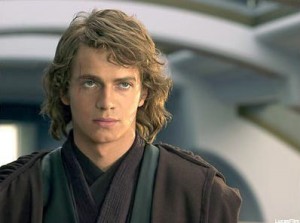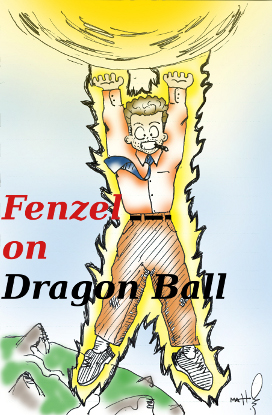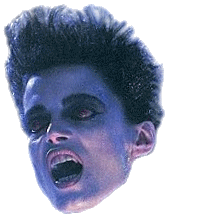In the new Street Fighter movie, Chun Li is REPEATEDLY told that only she can stop Bison.
There is no evidence of this.
—Matthew Belinkie, Overthinker
We’re going to go from the inside out here folks. I’m going to start talking about Dragon Ball and something I think makes Dragon Ball special — then I’m going to branch off pretty quickly into the rest of pop culture, why it is the way it is, and what it can learn from Toriyama’s storytelling style.
I was very glad when Atomic Red wrote in to ask us about “The Chosen One” in popular culture, because I’d just completed a vigorous e-mail exchange with Belinkie on this very topic — and on how it relates to how much the new Dragon Ball movie sucks in both concept and execution (although this was mostly drawn from the trailer, as I have not seen it yet).
According to the trailer, the Dragon Ball movie is about magical Dragon Balls being created by seven mystics who defended the earth from an alien invasion, and how somebody needs to find them so that he can save the world in the style of people who came before. Who? Why, “The Chosen One,” of course.
This is nonsense. Everybody knows the Dragon Balls were created by the Namekian Kami, after he banished evil from his body and became Guardian of the Earth, as a challenge to the people of Earth to test their courage and follow their dreams, and that most people looking for them at the beginning of the story just want sex.
Okay, maybe not everybody knows that. I will concede it is somewhat beside the point.
The point is, I am tired of prophesy and destiny dominating popular adventure media. I am so tired of reluctant, dithering heroes being told they need to do something that they are thoroughly incapable of doing and that is totally against their natures, with the main justification being a mystical prophesy that, until this very moment, has usually not come up in any of these characters’ lives.
Look, I don’t have a problem with the cliche in and of itself. I love Star Wars. Heck, it’s a pretty standard sort of story idea. It just only works for certain sorts of stories, which don’t need to be told all that often. Plus, it’s shoehorned into stories where it doesn’t work, doesn’t add anything, and doesn’t make sense — and it’s done so far too often with little in the way of subtlety.

Encouraged for ten years or more by modern misfit Bildungsromans like The Matrix and Spider-Man that are mostly just copping on Granddaddy Star Wars, it seems as if every other action movie out there takes a character in a thoroughly secular world and gives him a flimsy exclusivity on the spiritual.
And it’s more than just this specific character type; the character tends to come into his/her own in the same prectable way. Everything else in the world has clear, scientifically comfortable explanations — everything is nice and clean and people buy food at the supermarket, clothes at the mall and iPods at the Apple Store — except there is supernatural agency at work demanding that a 16 year old girl has to go try to jump kick a random third-world dictator dressed as a two-bit executive halfway across the world for no discernible reason, and that’s okay, because she’s special.
But why? Because God says so – except it isn’t God, it’s Destiny. Or the Prophets. Or a really smart primordial computer with a beard. Or the Seven Mystics of Ridiculous Travesty. Or <REDACTED RANT ABOUT THE THOROUGHLY INADEQUATE SERIES FINALE OF BATTLESTAR GALACTICA>.
Heck, a lot of the time, they don’t even bother to tell you who Chose the Chosen One in the first place. And that’s pretty frickin’ lame, because if I’m a protagonist, and I’m going to externalize all my motivations in life — to totally reverse my mentality and preferences and aspirations for myself because I have been Chosen, then I’m sure as Heck going to make a serious evaluation of the Chooser before signing any papers.
Being the Chosen One in some of these nonsense movies is like taking out a mortgage without knowing the name of the bank.
Credit card companies send me letters that I’ve been Chosen all the time. The correct Choice for those is to trash them. They should make a movie about a reluctant teenager who one day gets an e-mail from an old master who tells him he’s been CHOSEN, and that it’s his DESTINY help him save $10 million dollars that belong to a displaced African dignitary. All he has to do is send his bank account number . . .
On the other side of the coin, I am equally tired, if not more so, of that moment near the end of so many movies where somebody is about to do something, and then everybody stops, and somebody yells “YOU HAVE A CHOICE!”
You know, thank you for stopping everybody. It’s good you say that, because, up until this point, the guy has just been reading the script. Thanks.
Are all these movies being written by the same guy? Is there a script doctor who goes to every action movie and insists “No! No! Tell, don’t show! Tell me that the character needs to get in a fight. Tell me the character needs to throw the switch and turn off the Dark Electricity Generator or what have you. Explain it. Just say that it has to happen, and then we don’t have to worry about imitating or portraying human behavior, which is boring and bad for movies.
And I want more destiny in this picture. Nothing sells like determinism!”
Choosing Dragon Ball
Dragon Ball (at least the original comic) isn’t about any of that crap at all. Dragon Ball is about having fun, improving yourself and enjoying life even in the face of material and existential disaster. The first thing the protagonist Goku does in the book is fistfight a giant sword-wielding wolfman. The last thing he does is fistfight a 14-year old boy. Goku loves fighting, and he rarely has to be convinced to do it. If anything, he fights too much, which is why he is always getting killed and stuff.
In Dragon Ball, the characters who harp about destiny may win a few dozen early fights, but, when it matters, they always get their asses kicked, repeatedly and hard. The characters who win are the ones that work hard, push their limits, and love what they do. If you’re not having fun, you’re doing it wrong.
The Super Saiyan Apotheosis
In Dragon Ball, there is a myth of a Chosen One – The Super Saiyan, a mighty alien warrior who is unbeatable in combat and thus capable of establishing primacy across the galaxy. Through one of the major story arcs (and, some would argue, the best saga in the series), three different characters vie for this primacy.
Frieza – An arrogant intergalactic dictor with tremendous strength. He believes other people in general have little potential of consequence, especially relative to him.
Vegeta – An arrogant Saiyan Prince who believes he is the Chosen One, the coming Super Saiyan who will depose Frieza and rule the galaxy. He believes in destiny and station; that people cannot change their nature.
Goku – A well-meaning fellow who does a lot of push ups and primarily fights to save his friends and because he enjoys the challenge of it. He believes that individuals have great capacity for change.
Vegeta’s death at the hands of Frieza ties together the different plotlines and ideas of destiny very nicely —
http://www.youtube.com/watch?v=cF-dhJSNT8s
One of the great lines in this scene (and I think the scene has a lot of pretty great lines, although the pacing, as it always is with the TV show, is more than a bit off), comes after Vegeta dies, when you see Goku’s shadow over him.
“I’m the only one left.”
Not the Chosen One. Not the Super Saiyan. When a character in Dragon Ball says he fights because no one else will, or can, it’s usually because that character is dead or incapable of fighting (or too weak to matter).
These are all better reasons than the Chun-Li reason referenced at the top of this article. I didn’t see the Kristen Kreuk Street Fighter movie, but I was kind of hoping you’d see other people fight Bison too – see a match with Blanka, then a match with Dhalsim, etc. I mean, hypothetically, if Chun-Li decides not to go fight, there are a bunch of other folks who are more than willing to do it, all the way down to Dee Jay and T. Hawk.
Yes, Goku in Dragon Ball goes through an apotheosis where he is recognized as a special, singular individual and transforms into a hero of prophecy and destiny – but he is only able to do it because he rejects prophecy and destiny. It’s one of the great ironies of the series (and one of the structural elements of the underlying ideology of it that I find especially compelling).
Prophecy and destiny are revealed for what they are – an historical notion of what is possible, which should be listened to because of history’s tendency to repeat – or, as I’ve heard, “rhyme” with the past.
Sorry, I couldn't resist putting in a picture of Dee Jay and T Hawk (not necessarily in that order).
To complete the cycle, here’s Goku’s major apotheosis – it’s another case of a well-used motif – Vegeta dies at Frieza’s hands, telling Goku about their exploded planet, then Krillin is exploded in the sky, combining and reimagining the notion of a ravaged home. At Vegeta’s death, Goku takes on a heroic mantle of vengeance, his best friend Krillin is killed (an act that makes God himself shudder with helplessness), and Goku becomes something else —
http://www.youtube.com/watch?v=mKir_imxqV8
The main things to take away from this concerning Chosen Ones and the topic at hand here are:
- Goku has a reason for his tranformation that has nothing to do with destiny. (“I won’t let you get away with this.”)
- Nobody informs him that he has to transform, or tells him that he really ought to do it – you get to see the character take the action organically.
- Because nobody is clogging up the scene with nonsense about “MAKE A CHOICE” or “IT IS YOUR DESTINY!” the moment has a lot more dramatic and almost lyrical complexity. There’s an overlay of Goku’s responsibility for his birth world and his adoptive world (again, set up as so many things in Dragon Ball, by motif).
- There’s the question of how much active agency he actually has, which doesn’t really need to be identified right on the nose (and it cheapens it to do so).
- It’s a character-building moment for Goku. We see him in a somewhat unguarded moment doing things entirely from his internal motivations. Toriyama further refutes the idea of destiny and a Chosen One by having many characters make this same transformation later on in the piece – but it’s important to note that no two of them go through their first transformation in quite the same way.
- And most elegantly, it is done very efficiently, without much wasted dialogue. You don’t have to actually explain the things that are going on. It is enough to show them, as long as you have compelling character design.
So, let’s expand this away from Dragon Ball a bit.
Pay the Cost to be the Boss
Here are some of the major drawbacks of overrelying on an explicit “Chosen One” in a work of fiction (instead of, say, a complex apotheosis where ideas of destiny and fate are contributing factors, but not the governing or primary ones):
- The dialogue is going to suck. Just the words “Chosen One” are so cliche right now that it hurts any character to put them in his mouth.
- Your character becomes much simpler. There’s a reason that Keanu Reeves fits Neo from the Matrix so well – it’s because Neo is a frickin’ idiot with next to no personality. He’s so caught up in being or not being The One that he doesn’t bother to do any of the other things that make characters watchable.
- There aren’t going to be a lot of surprises. When a character is organically motivated by things that are internal and specific to him or herself, then that character can go in any number of different directions. If you’re relying on determinism and destiny to get the character where he’s going, well, then there’s only one place he’s going to be, and that hurts you in the “bag of tricks” department.
- It’s going to be harder to have diversity across characters. If you put your characters in a universe in which there is a “Chosen One” running around calling hims or herself that (or being called it by others), and if that’s credible in the world you’ve constructed, it can be very hard to find relevant stuff for your other characters to do. Clearly, it takes a lot of pressure off of them if some proxy for God is going to help this other dude and all they have to do is stay out of the way. If you make the backing for your protagonist less obvious, other characters can more believably think they are the hero, and this gives them their own opportunity to showcase their internal motives and to take interesting actions.
- You are hamstringing yourself with a very specific ideology. It’s not a given that your fictional universe has to have “Chosen Ones” in it, but if it does, certain other things are probably true – namely, that there is something out there that does the choosing.Think of how much better the later Matrix movies would have been if there were no Architect – if the Wachowskis didn’t feel so obligated in following through their “Chooser” to its semi-logical, absurd conclusion.
- It is lazy. For Christ’s sake, just use another word or something, at least. There are dozens of basically equivalent ways to motivate characters. Why use the same one everyody else is using?
However, there are also good reasons to use a “Chosen One” in your piece:
- You can ingratiate religious audience members or readers without pissing off any specific religion or unreligious people. It’s a nice red-state/blue-state style cultural cop-out.
- It adds stakes and purpose to characters that have no stakes and no purpose. Sometimes, you have somebody like Superman around, and there’s no reason for that guy to do anything. Might as well write in a prophesy, then. Keep in mind that you probably shouldn’t aspire to have characters with no stakes and no purpose.
- Hollywood will probably think better of you for it. Seriously, Hollywood screenwriting types seem to really like the idea of the Chosen One, because they see in their audiences a large mass of pretty ordinary people who are looking to be told that they are special. It’s a cynical act of fantasy fulfillment. Now, I’m not against fantasy fulfillment through movies, but I do think that, while making it this cut and dried makes it easy for a producer or scriptwriting seminar guy to analyze and talk about it with praise, this sort of “critic service” is probably not going to make your actual movie better, even though it might help it get produced.
- It is quick. Without the complexity of organic motives, you can breeze through discussions of why people do things and get straight to the action. This is probably the biggest reason why this tactic is so popular today. If you’re writing a movie for set pieces, you don’t want to waste time doing that other stuff, right? I say wrong, but that’s a topic for another post.
There’s a lot to talk about here, but I’ll leave it at that today. What do you think about Chosen Ones? Leave your thoughts in the comments!


